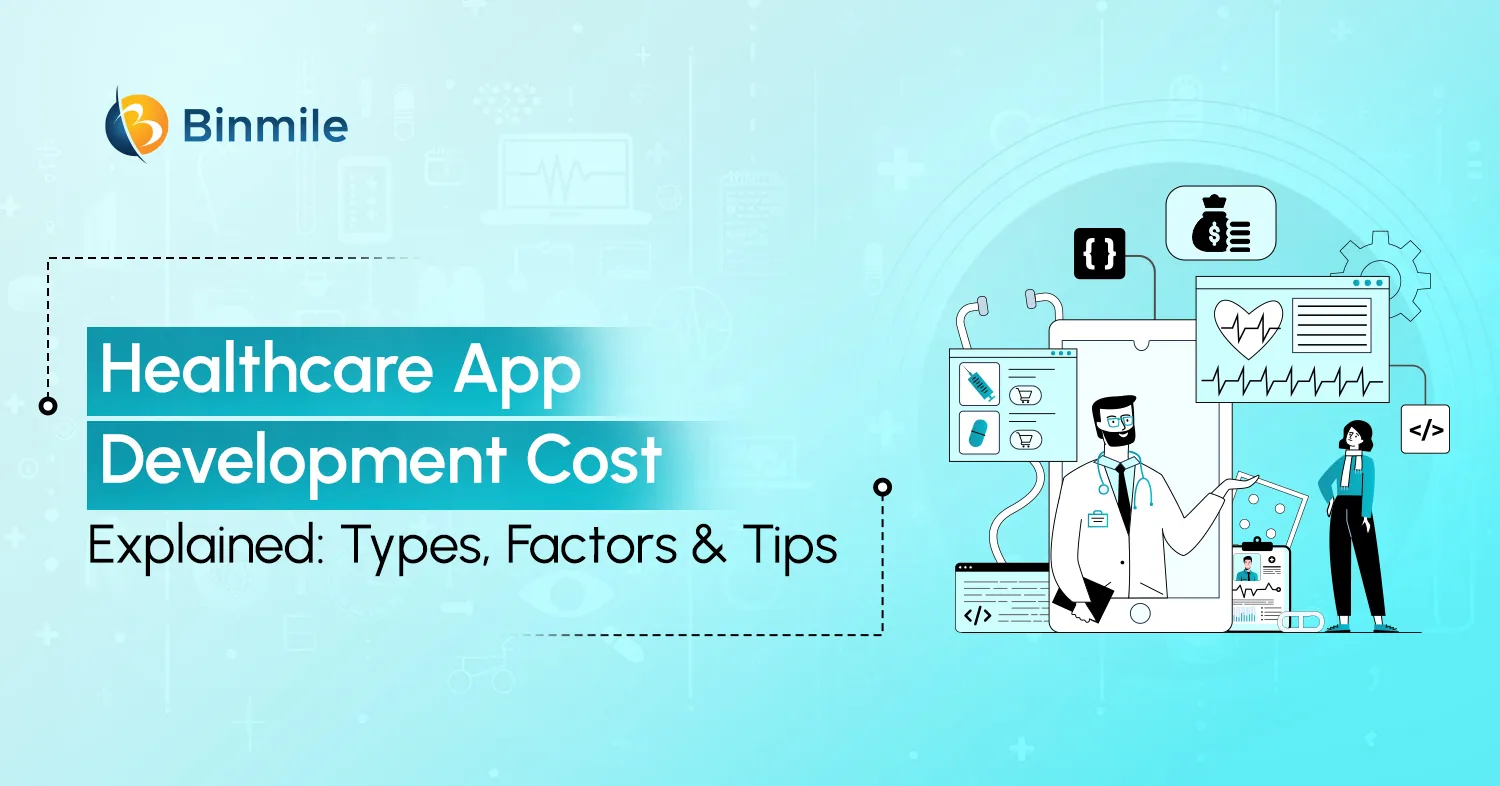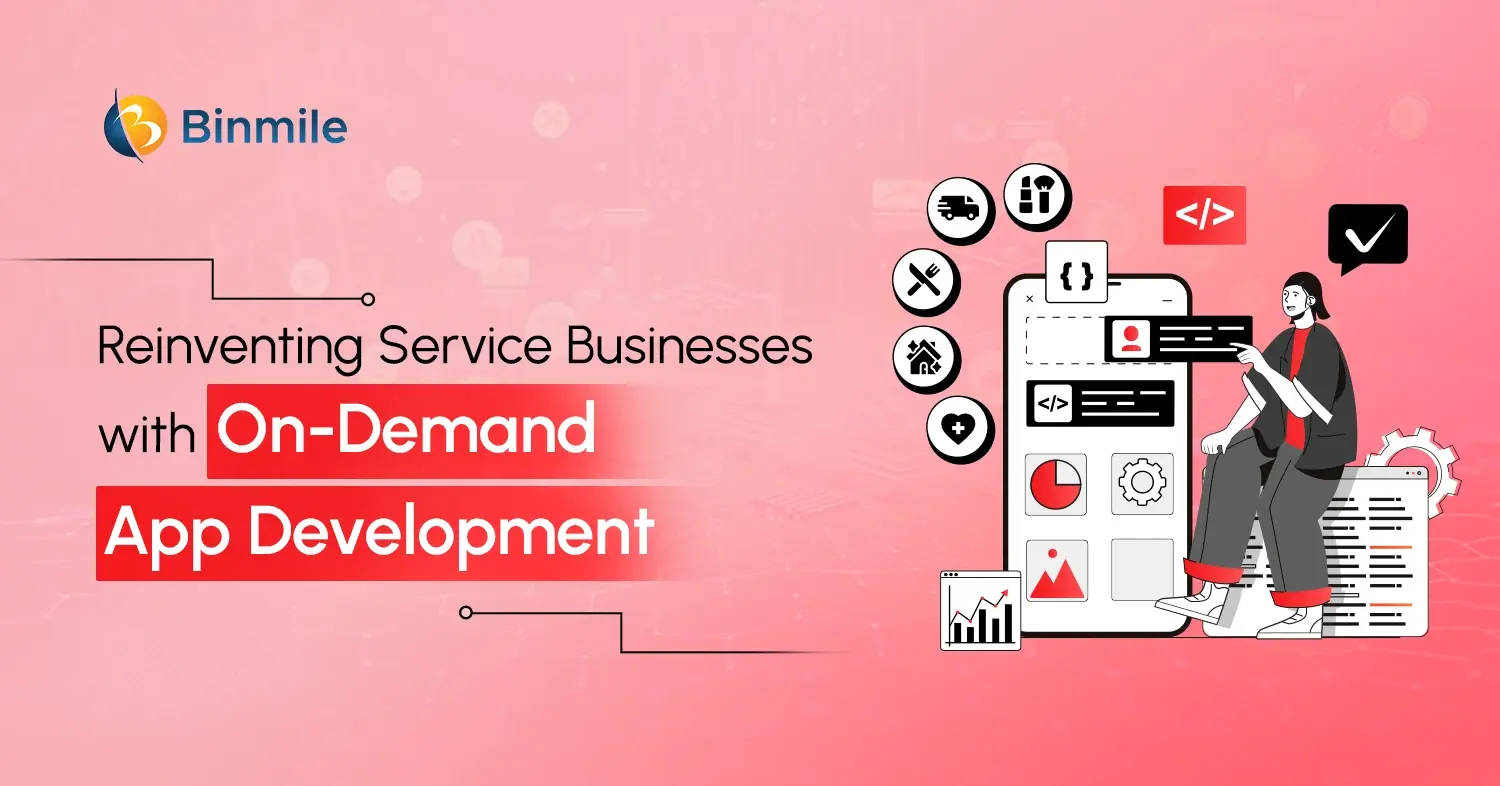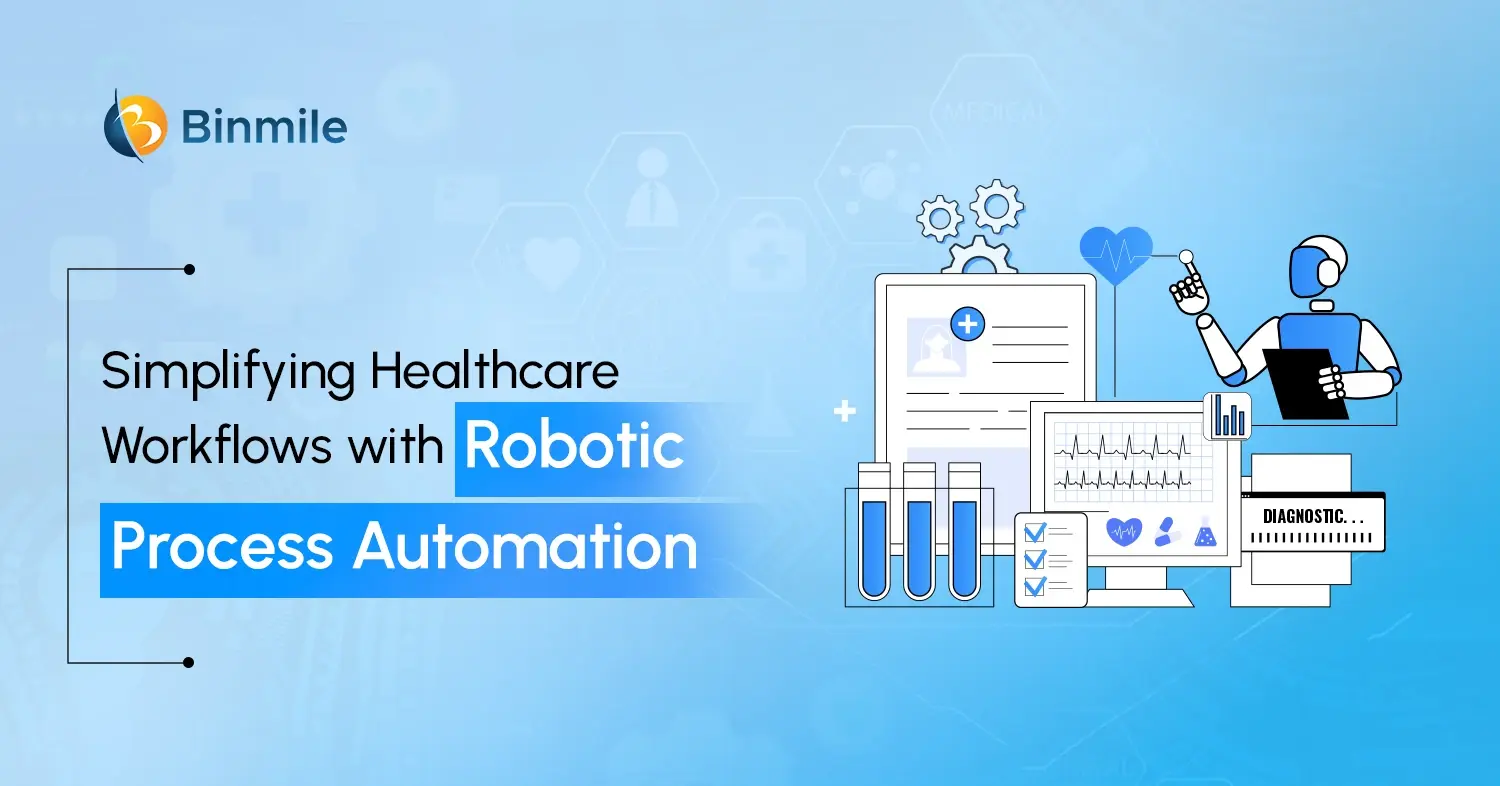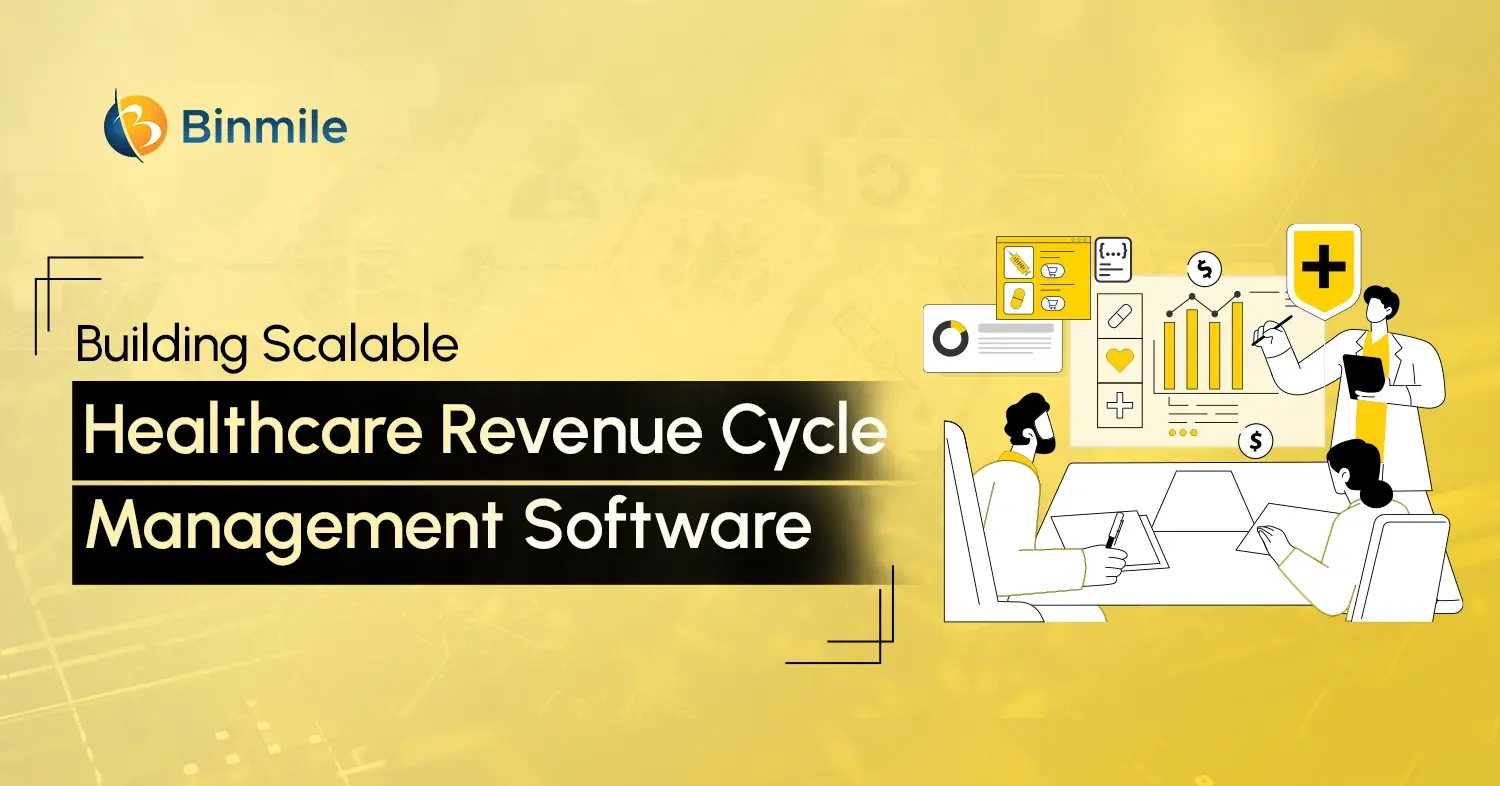- App Development Company
- application development company
- Comparing costs of healthcare app development
- Cost of developing a medical app
- cost to build a healthcare app
- cost to build a mobile app for healthcare
- Health app development cost factors
- Healthcare app development cost breakdown
- Healthcare app development pricing models
- healthcare application development
- Healthcare mobile app development cost
- healthcare web development cost
- medical app development
- mobile wellness business costs
- software development company
Mobile app technology is bringing a significant transformation in almost all industries, including the healthcare industry. The healthcare industry is now much more accessible with the invention of healthcare applications, or apps. These healthcare apps improve medical access by guiding people with fast medical supply delivery, online consultation, appointment scheduling, etc. However, despite the immense advantages and potential that healthcare apps bring, the focus should be on a critical aspect of healthcare application development—the cost.
Businesses must research and look into factors that provide them with a more sustainable healthcare app development process. There are varied parameters affecting the cost of building a healthcare app that meets your business goals and requirements. So, what are the types of healthcare apps? And what factors should be considered while developing these apps? In this blog, we’ll go through crucial factors that may impact the healthcare app development cost.
Popular Healthcare Apps: 5 Types to Know and Their Specific Cost
There are different types of healthcare medical apps and their specific costs that businesses need to understand before building a healthcare app for their end users. This will help them choose the best type that perfectly aligns with their actual necessities and requirements needed to be included in their app. However, to give you an estimated cost of developing a healthcare app, it ranges somewhere between $100,000 and $500,000.
So, if you’re wondering what the cost is to build a mobile app for healthcare, here’s a medical app development cost breakdown for different apps:
1. Telemedicine Apps
Telemedicine apps enable users to consult an experienced doctor remotely through digital modes like video calls, chat, and voice messaging. These mobile apps should have features that seamlessly connect patients to access medical services. Features should include secure communication, payment gateways, EHR systems, etc.
- Estimated Cost: $40,000 to $200,000
2. Wellness and Fitness Apps
Wellness and fitness apps help users to monitor their overall health progress, which includes diet, water intake, exercise, etc. This can be executed with the integration of wearables, such as smartwatches. Now, users can track physical activity, sleep, and more. This results in promoting healthy lifestyles and helping them plan their meals or activities with reminders and personalized AI recommendations.
- Estimated Cost: $30,000 to $100,000
3. Medical Networking Apps
Medical networking apps allow healthcare professionals to connect, discuss, and share information related to their patient cases. These apps focus on doctors collaborating with each other, generally for knowledge-sharing aspects. This helps in improved patient care, as it streamlines communication between different professionals.
- Estimated Cost: $30,000 to $60,000
4. Healthcare Billing Apps
Healthcare billing apps help in reducing administrative errors and automating the complex billing processes. Tasks that can be automated include payment tracking, insurance claims, receipt or invoice generation, etc. These help users get reimbursements on time and streamline the complex processes.
- Estimated Cost: $40,000 to $90,000
5. ePrescription (eRx)
ePrescription, or eRx, apps enable medical doctors to directly contact pharmacies and send digital prescriptions written by them. These apps help improve medical industry practices by minimizing fraud or errors that can be life-threatening.
- Estimated Cost: $40,000 to $80,000
Cost of Healthcare Mobile App Development: India vs. Other Regions
There are many factors that impact the medical app development costs. But one of the most suitable variables is the location from which the app development is outsourced. For outsourcing development needs, businesses have to choose the right country that not only provides them with a medical app but also uses the right dedicated teams and delivers a cost-effective solution. However, different regions come with their unique hourly rates and best strengths. Now, let’s explore a healthcare app development cost breakdown between India vs. the other 8 global regions:
| Country Name | Average Hourly Rate (approx.) | Total Cost (Estimateh in USh) | Best Strengths |
|---|---|---|---|
| India | $15/hour – $50/hour | $20,000 – $65,000 | Large IT talent pool, cost-effectiveness, and legal compliance |
| North America | $100/hour – $250/hour | $95,000 – $500,000 | AI-driven tools, high-quality products, and expertise |
| South America | $35/hour – $65/hour | $40,000 – $90,000 | Growing tech scene, time zone overlap, and affordability |
| Eastern Europe | $30/hour – $70/hour | $35,000 – $150,000 | Strong tech skills, regulatory compliance, and nearshore development |
| Western Europe | $75/hour – $185/hour | $80,000 – $350,000 | Security standards, skilled labor pool, and cost efficiency |
| China | $30/hour – $70/hour | $35,000 – $200,000 | Skilled workforce, integration support, and fast development cycles |
| Japan | $70/hour – $150/hour | $75,000 – $300,000 | Precise development, advanced technology, and innovation |
| Australia | $85/hour – $110/hour | $90,000 – $250,000 | Onshore development, regulatory alignment, and quality standards |
| New Zealand | $70/hour – $120/hour | $80,000 – $180,000 | Tech environment, reliable products, and a growing health sector |
| Brazil | $30/hour – $80/hour | $45,000 – $150,000 | Language support, favourable time zone, and reduced costs |
According to the tabular comparison, India is offering the most cost-effective healthcare app development with skilled and talented engineers. Apart from this, the Indian government supports and provides legal regulations for building and managing these apps effectively. So, businesses can consider building healthcare app development from India, but before that, consider some factors that may impact your healthcare app’s development cost.
Healthcare App Development Cost: Top 7 Factors Explained
The real cost of developing a healthcare application differs based on various factors. Businesses wanting to lay down proper budgeting and strategic development planning must consider these factors that can influence healthcare mobile app development costs:
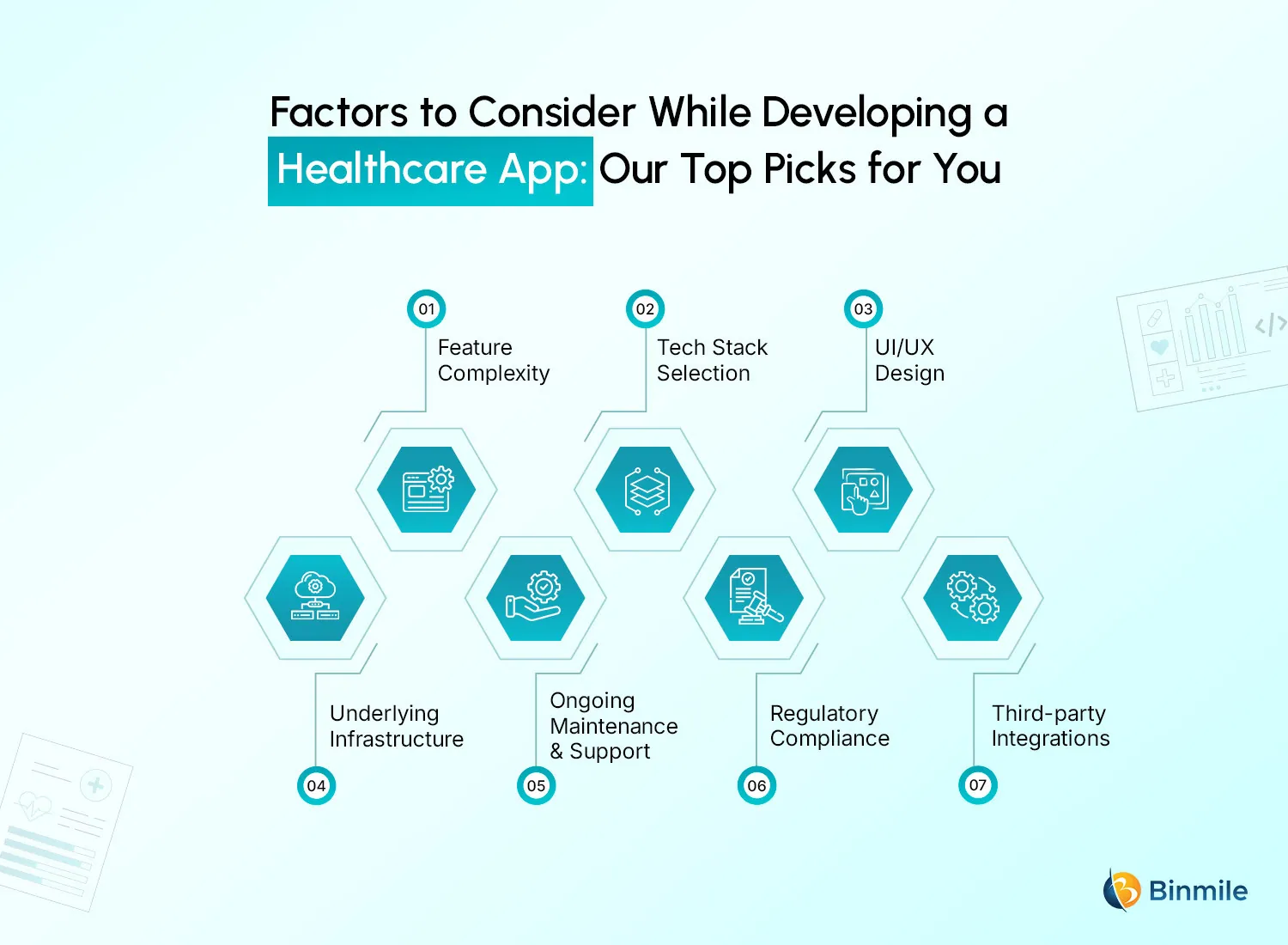
1. Feature Complexity
The level of app complexities or advancement of features directly impacts cost. Basic features like appointment booking may range from $5,000 to $10,000. In contrast, integrating advanced functionalities like AI-powered diagnostics can significantly increase the cost to $100,000 or more. These advanced features require much more development efforts and time, thus increasing the overall healthcare app development cost.
2. Tech Stack Selection
Developing a native healthcare app for iOS or Android involves building different codebases for each iOS or Android operating system. These native apps offer high performance but can be costlier, $20,000 to $40,000 per platform. Utilizing cross-platform frameworks, where a single codebase works for both operating systems, can be a more cost-effective development solution ($10,000-$20,000).
3. UI/UX Design
One cannot build an app without engaging, highly intuitive, and user-centric designs. Designing such an app depends on the intricacy of the design and the desired look and feel of the app. It may vary from $5,000 to $15,000 (approximate estimate). Businesses should keep in mind their specific customers’ pain points while designing the healthcare application.
4. Development Team Expertise
The application’s infrastructure is another factor that is the foundation of developing a healthcare app. A reliable and scalable infrastructure results in improved performance of the app and provides real-time functionalities.
The cost may vary from $15,000 to $100,000, depending on the type of components used and their reliability. There are some newly emerged components to add, such as cloud hosting (AWS or Azure), firewalls, performance tracking tools, and more. These infrastructure components help in handling the complex user data loads and ensure that the data remains private and secure.
5. Ongoing Maintenance & Support
To ensure smooth operation, businesses must set aside some budget for post-development maintenance. After the launch, maintenance is a very crucial aspect that can ensure that the app is meeting all the regulatory requirements and evolving business needs. Businesses should consider that an additional cost of about 15-20% of the total is going to be spent on ongoing bug fixes and future updates.
6. Regulatory Compliance
These medical apps handle patients’ sensitive data, such as personal details and insurance information. This sensitive data needs to be managed and requires adherence to various regulatory bodies like HIPAA and GDPR. To do so, businesses need to have separate cost planning for legal fees and security audits. Depending on the app’s scalability level, the estimated cost for regulatory requirements can vary from $10,000 to $20,000. These periodic security audits establish trust and mitigate the cyber risks that can occur, resulting in improved access control.
7. Third-party Integrations
Integrating wearable devices or Electronic Health Record (EHR) systems is essential for offering personalized medical services, which adds to additional development costs. EHR systems are like an electronic repository that contains all the medical records of a patient. This system can be very helpful, as it helps in easy access to important medical records and scheduling appointments whenever necessary. The cost associated with this will depend on the complexity of the integration process and may vary between $800 and over $2,000.
Get a free cost consultation of your health application development and project estimation from our app development experts!
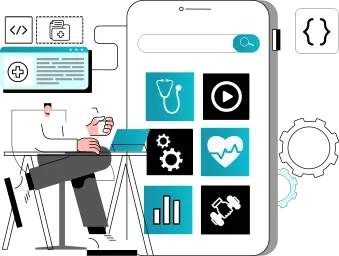
Best Practices for Reducing the Costs of a Healthcare App Development
Here are 5 steps that businesses need to follow to reduce healthcare mobile app development costs:
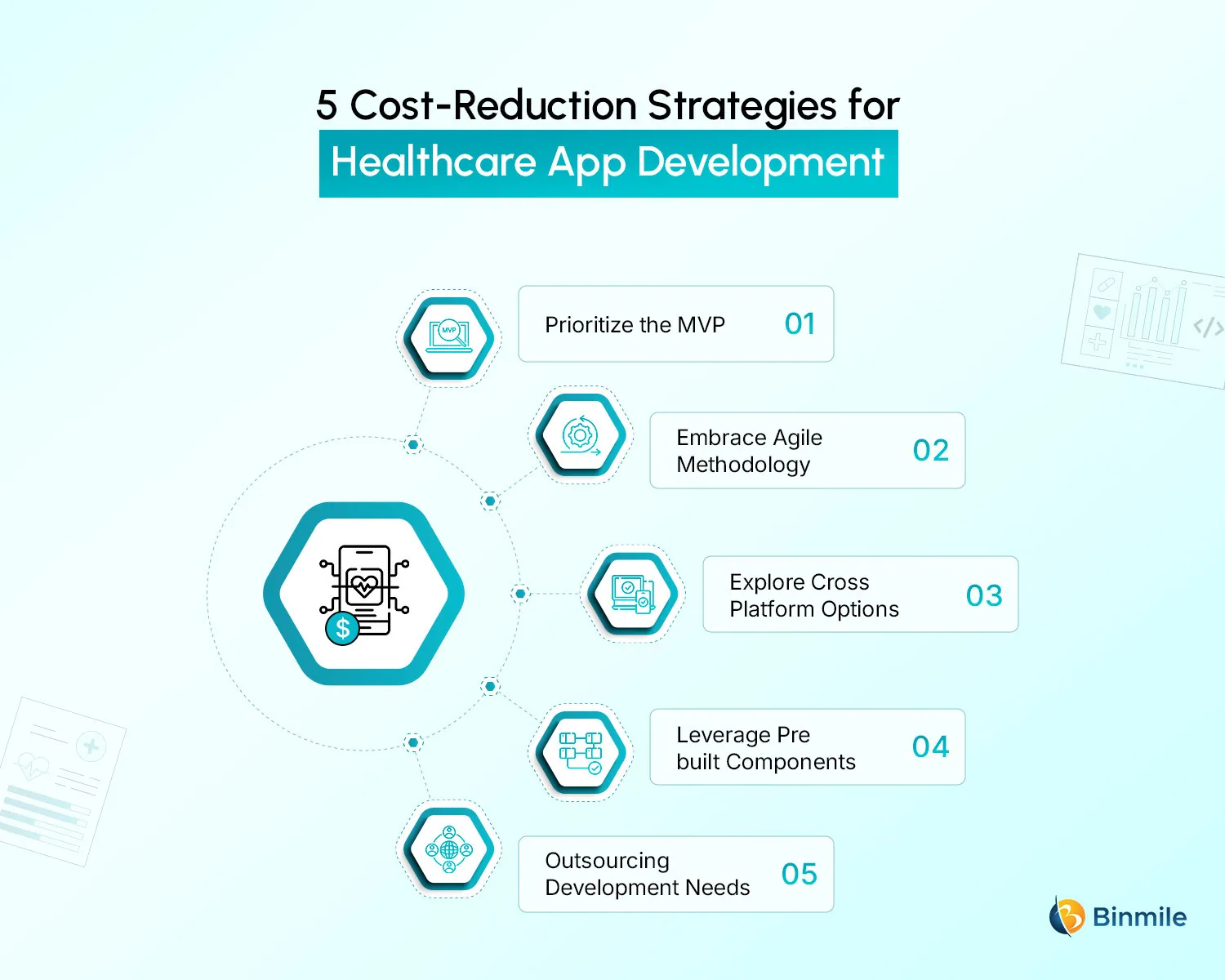
1: Prioritize and Focus on MVP
Don’t straight-up dive into building an entire application from the get-go. For a useful implementation, always start by specifying the main functionalities of the app. This will help businesses in delivering high-quality products to the end users (patients or healthcare providers).
This presentation of a simple app version with main features is known as building a Minimum Viable Product or MVP. MVP enables businesses to test their products in the market and see if they are viable or not. This also helps them gather feedback from end users and then change their strategies.
2: Embrace Agile Development Methodology
Agile methodology is a strategic mindset that promotes an iterative strategy. This means that it promotes the delivery of an iterative software development cycle, which is called a sprint. These manageable, small sprints help dedicated development teams to maintain the development pace, which ensures customer satisfaction by delivering quality products on time.
Teams should focus on dividing a whole task into smaller parts and be ready for feedback loops. This enables them to course correct and allows prioritization of users` insights and might eliminate extra functions that could elevate healthcare web app development costs.
3: Explore Cross-Platform Development Options
The native application provides better performance, but businesses should also consider a cross-platform framework; there are options such as React Native or Flutter. These frameworks utilize a single codebase for multiple operating platforms, mainly iOS and Android systems. Choosing cross-platform development over native development eventually leads to a streamlined development process. With a single codebase, it also ensures faster testing cycles, which improves the time-to-market delivery time.
By leveraging cross-platform frameworks, businesses can reach a wider audience base, as this development supports multiple platforms. It also enables teams to provide a consistent look and feel of the app, which improves user experience significantly.
4: Leverage Pre-built Components and APIs
Open-source healthcare applications often build on many pre-developed software development kits (SDKs) and application programming interfaces (APIs). These pre-built components employ functions such as scheduling an appointment, user authentication, component synchronization, and more. By performing these functions, development teams can save their efforts and directly use the pre-built connectors, which results in a more efficient development process.
With the help of pre-built components or tools, businesses can accelerate the development process. They can also help cut down the resources that are needed to create everything from scratch.
5: Outsource Strategically
Outsourcing development needs from a vendor is the most effective way to lower healthcare mobile app development costs. Businesses can hire global talent to work on their project, which possesses the expertise of all the major SDLC components. From developers and designers to QA testers and project managers, these are all managed under one roof using an outsourcing organization.
Businesses can shift their focus to other business strategies and, therefore, cut down on the costs without compromising on the quality. Some of the strategies include marketing promotion of the product, regulatory planning, and more such executions.
Final Thoughts
The rise of technology has surely reshaped the way healthcare services are delivered. Health application services, or healthcare apps, are prime examples. However, building quality healthcare services will require highly functional and agile mobile apps to resolve the pain points of both patients and healthcare professionals. It is a little complicated to develop a highly effective and efficient healthcare mobile application without breaking the bank. But it’s not impossible. The cost remains the main concern for many top app development companies, as they need to have a solution that can minimize the overall development cost. Hopefully, this blog has helped them find answers.
By creating a healthcare app on a more manageable budget, businesses can streamline the development process and make informed business decisions. In this blog, we discussed the healthcare app types and the top 7 factors that may influence healthcare app development cost. Additionally, we also shared a few tips to reduce the burgeoning development cost. If you are specifically looking to develop a pharmacy app like Walgreens, understanding these cost factors will help in planning efficiently. However, to make health application development simpler, consult an app development company that provides healthcare app services, helping in aligning the development needs with the specific client’s budget or vision.
Frequently Asked Questions
Yes, outsourcing to a specialized healthcare app development company can be a cost-effective and time-saving strategy. Offshore development teams, especially in countries with lower labor costs, can deliver high-quality results at a reduced rate. Additionally, you gain access to industry-specific experts, saving money on hiring, training, and infrastructure setup.
The timeline to develop a healthcare app depends on the features and development methodology.
-
A Minimum Viable Product (MVP) might take 3–4 months.
-
A full-scale healthcare solution can take 6–12 months or longer.
The timeline can also be impacted by approval from app stores, regulatory audits, and beta testing feedback.
Yes, healthcare is a regulated and sensitive domain. Building secure, scalable, and compliant apps requires specialized knowledge. A general software team might miss crucial requirements, leading to compliance issues or user dissatisfaction. A dedicated healthcare app development company ensures your app is both functionally rich and medically accurate, reducing risk and increasing user trust.
Absolutely. Binmile has extensive experience in integrating EHR/EMR systems (like Epic, Cerner), video calling APIs (like Twilio, Agora), and secure payment gateways. We ensure that every integration is seamless, compliant, and optimized for performance and user experience.
Yes. We have a dedicated design team that specializes in crafting intuitive, accessible, and user-centric healthcare app interfaces. Whether you’re targeting patients, doctors, or administrators, we design workflows that meet both usability and compliance standards.
